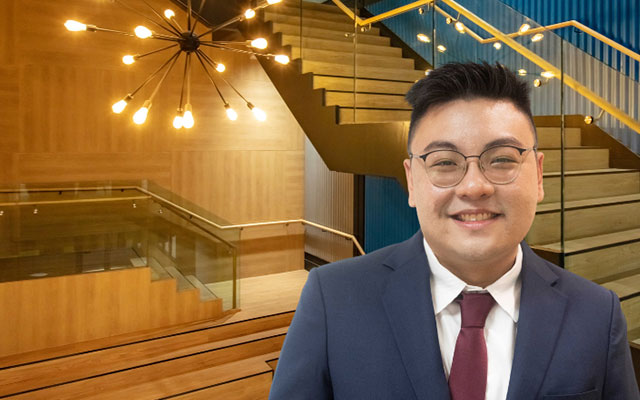
Q1: What made you decide on SMU and the MPA programme for your postgraduate studies?
I realise that accounting knowledge is instrumental for strategic planning and decision-making in any organisation. This belief has been firmly reinforced by the cashflow challenges I have seen organisations experience while carrying out resource-intensive multi-year projects.
With that in mind, I wanted a highly reputable university that offered a decent curriculum for accounting. The course must provide me with a blend of highly transferable accounting theory and real-world business skills. Furthermore, I wanted to be immersed in an academically rigorous environment where people learn together interactively in small-sized classes so that I would have the opportunity to form strong bonds with my classmates.
Thus, as I undergo the time-consuming process of researching for a suitable university and course from a large pool of Singapore and other overseas universities, I have selected SMU and its MPA programme as I believe it has consistently met all these criteria and beyond in and outside the classroom.
Q2: How did the SMU experience meet your expectations?
Exploration is crucial in both our academic and everyday lives. As it is vital to keep a healthy balance between studying and social life, I wanted to enjoy my time whilst attending SMU. Therefore, I decided to join the class committee to create a sense of belonging and fun for myself and my fellow students. In the class committee, I served as the president of my cohort and adviser to the next intake that came after me. The committee worked extremely hard to organise, promote, and participate in thought-provoking events that broke the ice between students and created a vibrant student experience at SMU. Overall, although I would say that serving on a committee requires work, you will have lots of fun and create lifelong memories with your friends.
Besides the fantastic class committee experience, I think the MPA faculty are extraordinary in their own right. They are incredibly knowledgeable, remarkably approachable, and even are open to divergent viewpoints. They are also concerned about our future and well-being. For instance, after receiving advice about the importance of data science in accounting from my data modelling and visualisation lecturer, Mr. Benjamin Lee, I signed up to complete SMU's Advanced Diploma in Python Programming and Machine Learning concurrently with my MPA program. I joined the program because I believe that accounting professionals are progressively expected to add value to their organisations and customers. Hence, the ability to analyse data is essential. Ultimately, your SMU experience is what you make it. You just have to find your own path along the journey to fulfilment.
Q3. What were some critical skills and knowledge you picked up during the MPA that was pivotal to your professional development?
Besides covering a broad range of traditional accounting subjects like financial and management accounting, I would say that the MPA programme has allowed me to develop an analytical mindset rather than relying on "gut feeling" anecdotal evidence as I did in the past. For instance, I have learned to apply simulation and optimisation models for different situations using various software such as Tableau, Jupyter Notebook, and Alteryx, which I believe is becoming more crucial now in the digital era where data holds so much value.
Furthermore, with the overemphasis on paper chase in society, soft skills have become an underrated art in the workplace. Through SMU's unique interactive pedagogy, I have gradually been nudged to hone my self-confidence, communication, and social skills to become a more confident orator. If singing in front of a public audience of hundreds of people sounds intimidating to you, the old introverted me would have agreed and not coped at all under the spotlight. To my amazement, I had managed to enjoy performing with all eyes on me at the recent school completion dinner. I guess I am trying to make the point that it is better to fail in a classroom than in an actual business boardroom. SMU offers a safe, comfortable environment and many opportunities for building most life and professional skills. All you have to do is to be willing to try and enjoy the journey.
Q4. Any advice for others thinking of pursuing a postgraduate experience?
Before starting a postgraduate course, it would be wise if you could weigh the pros and cons, discuss with your loved ones, and reach out to people who have completed the same or similar program to reach an objective decision. Be open and genuine to yourself about what you could gain, like improved employability and skills, and what you would lose, like family time and the opportunity cost of doing something else. Therefore, should you see the course as a means to your end goals and be able to justify the potential rewards in professional, personal, and relationship gains that postgraduate education can provide, the SMU Master’s degree experience will definitely open up your career options, put you together with fascinating and like-minded people, and even amaze yourself with how much more you are capable of by pushing you to your limits.
Q5. Any other advice you would like to share?
Participating and speaking up during class is essential as it contributes to your final grade in all your modules at SMU. Should you have no idea what to say, you can start by summarising the speaker's comment to show that you have listened well to their thought process. Subsequently, you can highlight what is interesting or compelling about their argument before explaining respectfully and constructively why and how you agree or disagree. Hence, your contributions to discussion-based lectures are listening, responding, and questioning, which all the professors would gladly appreciate.